Table of Contents
Get started with MyPerfectResume today!
- Build a resume on any device
- Pick an ATS-friendly template
- Tailor with AI copy suggestions
Why this resume works
- Quantifies accomplishments: By pulling metrics like a 15% cost reduction and a 30% accuracy improvement, the applicant shows their impact effectively.
- Uses action-oriented language: Using action verbs such as “reduced” and “implemented,” the applicant showcases initiative and effectiveness.
- Shows digital literacy: Leading their team in a transition to a cloud-based logistics platform showcases practical computer skills that improve operational efficiency in modern logistics settings.
More Logistics Specialist Resume Examples
Take a look at these logistics specialist resume examples to learn how to showcase your supply chain management skills, inventory control expertise, and coordination abilities. Use these samples to help you build a resume that highlights industry-relevant experience effectively.
Entry-level logistics specialist
Why this resume works
- Centers on academic background: Advanced degrees in logistics management and supply chain management reflect a strong academic foundation, emphasizing their readiness for early-career achievements in the field.
- Effective use of keywords: Incorporating industry-specific terms like inventory management and supply chain optimization ensures alignment with keywords essential for passing ATS filters effectively.
- Illustrates problem-solving ability: The applicant’s innovative solutions, like optimizing inventory turnover by 10% and improving delivery time by 20%, clearly illustrate their problem-solving skills and critical thinking.
Mid-level logistics specialist
Why this resume works
- Points to measurable outcomes: Reducing supply chain costs by 15% and improving shipping accuracy by 20% highlight the applicant’s ability to achieve measurable outcomes through strategic logistics management.
- Demonstrates language abilities: The applicant’s language skills in Spanish, Mandarin, and French improve cross-cultural communication, supporting global logistics operations.
- Displays technical expertise: Certifications like Certified Logistics Specialist and Supply Chain Certification demonstrate technical expertise essential for optimizing inventory systems and ensuring accurate shipping processes in complex supply chain roles.
Experienced logistics specialist
Why this resume works
- Showcases impressive accomplishments: Highlighting standout achievements like reducing department expenses by $200K annually, the applicant’s accomplishments reflect senior-level performance and significant business impact.
- Focuses on work history: Using a chronological resume format emphasizes extensive experience, showcasing how they honed their expertise throughout their career.
- Sections are well-organized: Bullet points and headers make sections well-organized, ensuring the resume is easy to scan and reader-friendly for anyone reviewing it.
Logistics Specialist Resume Template (Text Version)
Jane Johnson
Brookfield, WI 53011
(555)555-5555
Jane.Johnson@example.com
Skills
- Logistics Planning
- Supply Chain Management
- Inventory Management
- Process Optimization
- Data Analysis
- Vendor Management
- Project Coordination
- Transportation Strategies
Languages
- Spanish – Beginner (A1)
- Mandarin – Intermediate (B1)
- French – Beginner (A1)
Professional Summary
Dynamic Logistics Specialist with 8 years boosting efficiency. Proven track record of optimizing supply chains and cost reduction. Expert in inventory management and data-driven strategies.
Work History
Logistics Specialist
Precision Logistics Solutions – Brookfield, WI
July 2020 – August 2025
- Reduced shipping costs by 15% via route optimization
- Implemented inventory system improving accuracy by 30%
- Led team transitioning to cloud-based logistics platform
Supply Chain Coordinator
Global Transport Enterprises – Brookfield, WI
June 2016 – June 2020
- Enhanced supply chain efficiency by 20%
- Managed logistics for 50+ international shipments monthly
- Optimized warehouse layout saving 500 sq. ft. space
Operations Planner
Efficient Freight Solutions – Brookfield, WI
July 2012 – May 2016
- Coordinated logistics for 70 daily shipments
- Increased delivery speed by 10% using new scheduling
- Implemented tracking reducing lost packages by 25%
Certifications
- Certified Supply Chain Professional – APICS
- Logistics Management Specialist – Logistics Learning Alliance
Education
Master of Science Logistics and Supply Chain Management
University of Chicago Chicago, IL
June 2012
Bachelor of Business Administration Operations Management
University of Illinois Champaign, IL
June 2010
Related Resume Guides
Advice for Writing Your Logistics Specialist Resume
Learn how to write a resume tailored for a logistics specialist role.
Whether you’re coordinating shipments or managing inventory, our tips will help you highlight your unique skills and experience in the logistics field.
Highlight your most relevant skills
When applying for a job as a logistics specialist, listing your relevant skills is very important. This helps the employer quickly see what you can bring to the team.
Having a dedicated skills section makes it easy for them to find this information. Be sure to balance both technical skills, like inventory management and route optimization, with soft skills, such as communication and problem-solving.
Integrating key skills into your work experience section can make your resume even stronger. For example, if you list “supply chain management” in your skills section, mention specific times when you managed supply chains in your past jobs.
This shows that you not only have the skill but also know how to use it effectively in real-world situations. By doing this, you create a more compelling picture of yourself as a capable logistics specialist.
For logistics specialists, a resume format that highlights your organizational skills, supply chain knowledge, and problem-solving abilities can boost your chances.
Showcase your accomplishments
Organizing your work experience in reverse-chronological order is important for your resume as a logistics specialist. Start with your most recent job and work backward.
Each entry should clearly show your job title, the name of the employer, location, and the dates you worked there. This format helps potential employers quickly see where you’ve been working and how long you’ve been doing it.
Instead of just listing what you did daily, try to turn those duties into accomplishments by including measurable results. For example, instead of saying “managed deliveries,” say “increased delivery efficiency by 20% through route optimization.”
Using numbers like percentages or cost savings can make your achievements stand out. Hiring managers love to see action-oriented words like “improved,” “reduced,” or “streamlined” because they show that you made a real impact in your previous roles.
Quantified accomplishments let hiring managers quickly understand what skills you bring to the table. They help paint a clearer picture of how effective you were in past jobs and can set you apart from other applicants.
By focusing on results rather than tasks, you’ll present yourself as someone who not only did their job but excelled at it.
5 logistics specialist work history bullet point examples
- Managed logistics operations for a fleet of 50+ vehicles, reducing delivery time by 20% through route optimization.
- Coordinated shipments and inventory for multiple distribution centers, improving order accuracy by 30%.
- Implemented a new tracking system, increasing shipment visibility and reducing lost items by 25%.
- Negotiated contracts with carriers, achieving a cost savings of $200,000 annually.
- Led cross-functional teams in logistics projects, resulting in a 15% improvement in supply chain efficiency.
Resumes should balance clarity and professionalism. It’s important to choose a resume template with bold headings and standard fonts, avoiding cluttered visuals or intricate designs that distract from showcasing your skills, expertise, and experience.
Write a strong professional summary
A professional summary is the first thing hiring managers see on a resume. It acts as your introduction and sets the tone for the rest of your application. When crafting this section, you need to decide between using a professional summary or an objective statement based on their experience level and career goals.
A resume summary is a concise overview of your work experience, skills, and major achievements. It’s ideal for experienced applicants like logistics specialists who want to highlight their professional identity and showcase measurable impact. This section answers the question, “What have I accomplished?” by emphasizing how your expertise adds value to potential employers.
In contrast, a resume objective focuses on future career goals and contributions you aim to make. Objectives are better suited for entry-level workers, career changers, or those with gaps in employment. While summaries focus on past achievements, objectives explain “What I aim to contribute.”
Now that you understand these options, let’s explore examples tailored for various levels of experience.
Logistics specialist resume summary examples
Entry-level
Recent graduate with a Bachelor of Science in Logistics and Supply Chain Management, holding certification in logistics, transportation, and distribution (CLTD). Possesses strong analytical skills and foundational knowledge in inventory management and demand forecasting. Enthusiastic about optimizing supply chain processes and contributing to efficient logistics operations.
Mid-career
Logistics specialist with over six years of experience in managing end-to-end supply chain processes for the retail industry. Proven track record in reducing operational costs through strategic planning and supplier negotiations. Proficient in using ERP systems for inventory control and demand planning. Known for effective cross-functional collaboration to streamline logistics workflows.
Experienced
Seasoned logistics specialist with 15+ years of expertise in global supply chain optimization and team leadership. Certified Six Sigma Black Belt with a history of implementing lean methodologies that increased efficiency by 30%. Skilled at leading large teams through complex logistical challenges while maintaining high standards of service delivery. Committed to driving continuous improvement and achieving sustainable business growth.
Logistics specialist resume objective examples
Entry-level
Detail-oriented and highly organized individual with a background in supply chain management seeking an entry-level logistics specialist role. Eager to apply academic knowledge of inventory control, transportation coordination, and demand planning to support efficient operations within a fast-paced environment.
Career changer
Results-driven professional transitioning from retail management into logistics, bringing strong skills in team leadership, problem-solving, and operational efficiency. Interested in contributing to a company’s supply chain success by streamlining processes and ensuring timely delivery of goods.
Recent graduate
Recent graduate with a degree in business administration and coursework in logistics eager to begin a career as a logistics specialist. Passionate about using analytical skills and knowledge of distribution strategies to contribute to seamless supply chain operations.
Save time and stress when creating your logistics specialist resume by using our AI Resume Builder to easily highlight your skills in organizing, managing, and coordinating supply chains.
Match your resume to the job description
Tailoring your resume to match job descriptions is very important. It helps you get noticed by employers and pass through applicant tracking systems (ATS). These systems scan for specific keywords from the job postings. If you customize your resume to include these words, it has a better chance of catching the employer’s attention.
An ATS-friendly resume uses keywords and phrases that match both your skills and the job description. This increases the chances of hiring managers noticing you. By using the right words, your resume can stand out in a pile of applications.
To find the right keywords, read the job posting carefully. Look for skills, qualifications, and duties mentioned more than once. For example, if you’re applying for a logistics specialist position, look for terms like “supply chain management,” “inventory control,” or “transportation coordination.” Using these exact phrases is key.
Incorporate these terms naturally into your resume content. For instance, instead of just saying “Managed inventory,” you could say “Successfully managed inventory to optimize supply chain processes.” This way, you’re not only using keywords but also showing what you’ve done with those skills.
Targeted resumes help make sure your application gets seen by both ATS and hiring managers. By matching your skills to what employers are looking for, you increase your chances of getting an interview and landing the job you want.
Ensure your resume passes the applicant tracking systems! The ATS Resume Checker spots common mistakes and offers tips to make your resume better.
FAQ
Do I need to include a cover letter with my logistics specialist resume?
Yes, including a cover letter with your logistics specialist resume can improve your application and give you an edge in securing interviews.
A cover letter provides the opportunity to explain your interest in the role, highlight relevant logistics experience, and showcase specific skills like inventory management or supply chain optimization.
For instance, if the company uses advanced logistics software or focuses on sustainable practices, you can discuss your expertise or enthusiasm for those areas.
You might find it useful to use our Cover Letter Generator to create a personalized cover letter that aligns with your resume and highlights key achievements effectively.
Additionally, reviewing cover letter examples tailored to logistics roles can offer valuable insights and help you craft a compelling narrative.
How long should a logistics specialist resume be?
For a logistics specialist, a concise one-page resume is often sufficient to highlight key skills such as supply chain management, inventory control, and skill in logistics software. This format keeps your experience focused and compelling.
However, if you have extensive experience or specialized certifications like Six Sigma or Lean Management, a two-page resume might be more appropriate. This allows you to showcase detailed accomplishments and complex projects you’ve managed without overwhelming the reader.
It’s important to tailor the length based on your career stage—explore our guide on how long a resume should be for examples and tips.
How do you write a logistics specialist resume with no experience?
When crafting a resume with no experience for a logistics specialist role, highlight your education, relevant skills, and any related coursework or certifications that can demonstrate your potential in the role.
- Emphasize your education: Start by listing your degree in logistics, supply chain management, or a related field. Include the name of your institution, graduation date, and any honors received.
- Highlight transferable skills: Focus on skills such as organization, problem-solving, time management, and skill in software like Excel or ERP systems. These are important for logistics roles.
- Include relevant coursework or projects: If you completed any notable projects or coursework during your studies that pertain to logistics, describe them briefly. Detail what you did and the outcome to show practical understanding.
- Add internships or volunteer work: Even if unpaid, mention any internships or volunteer positions related to logistics. Outline your responsibilities and achievements to provide evidence of hands-on experience.
For more detailed examples and tips on creating a resume with no experience specifically tailored for a logistics specialist position, refer to our comprehensive guide.
Rate this article
Logistics Specialist
Share this page
Additional Resources
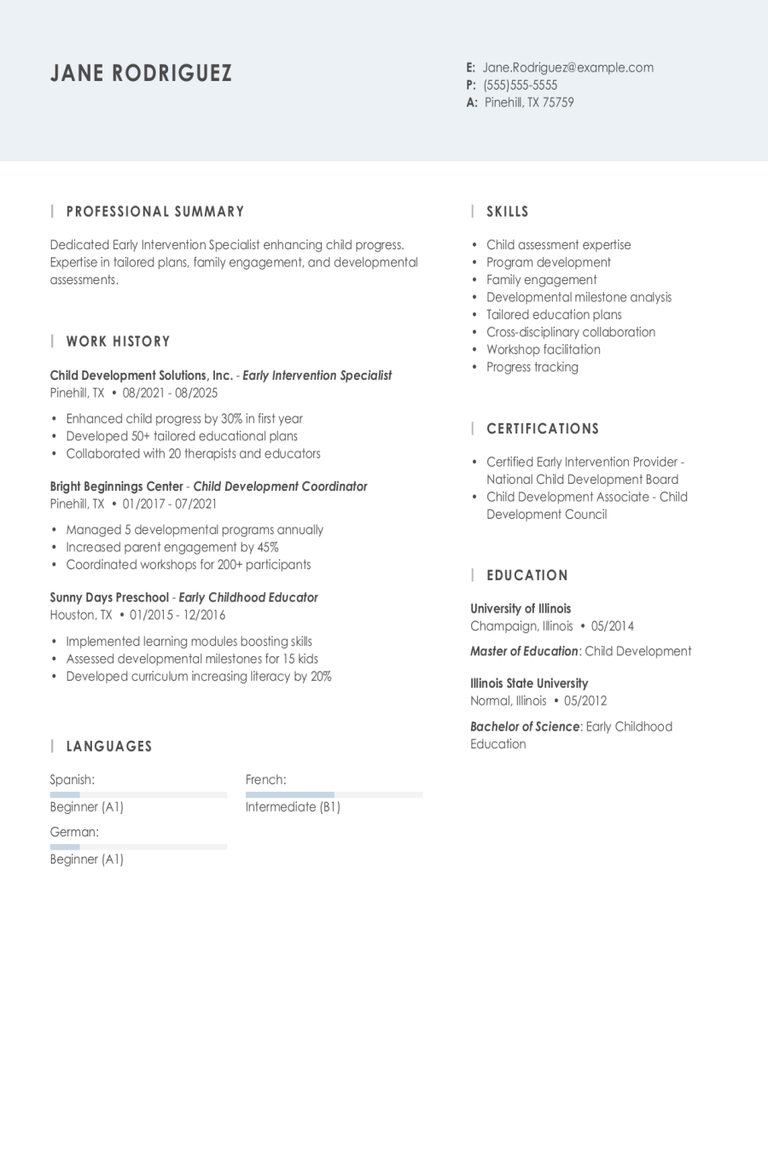
Early Intervention Specialist Resume Examples & Templates
Discover early intervention specialist resume examples and tips that will help you highlight your skills in child development, communication, and teamwork to make your experience stand out.Build my resumeImport existing
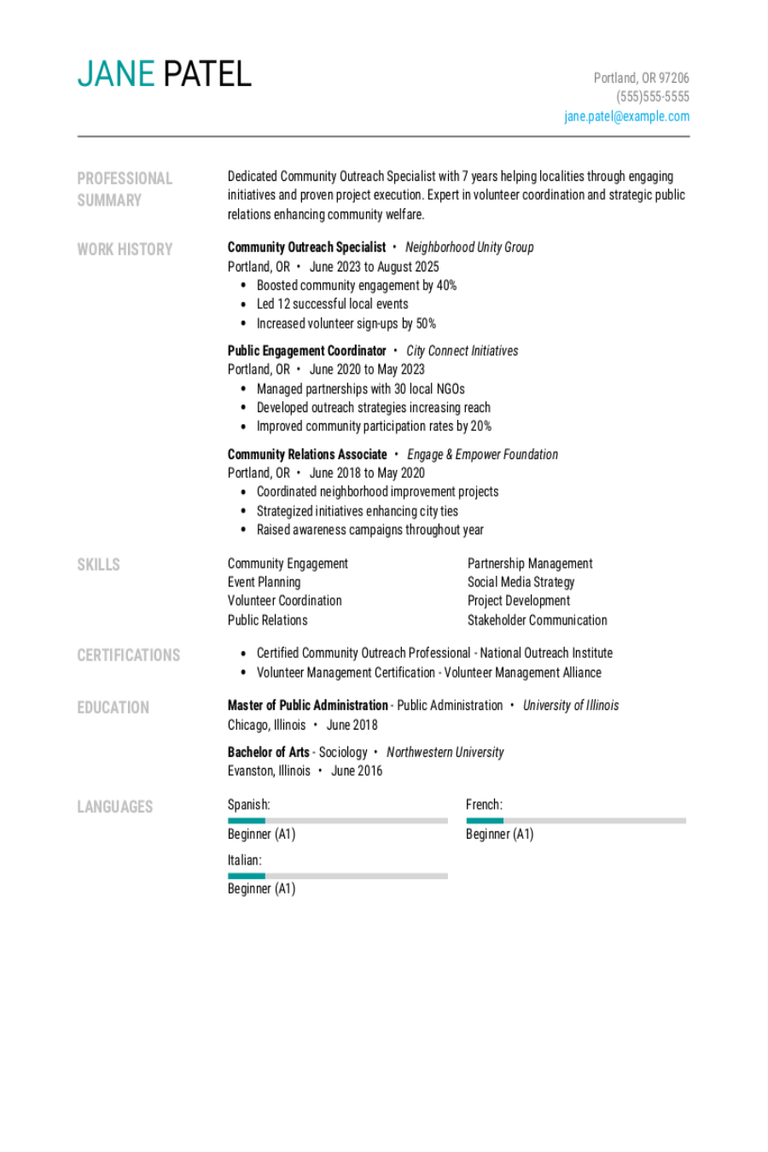
Community Outreach Specialist Resume Examples & Templates
Browse community outreach specialist resume examples and learn how to show you connect with people, plan events, and support your community.Build my resumeImport existing resumeCustomize this templateWhy this resume worksQuantifies
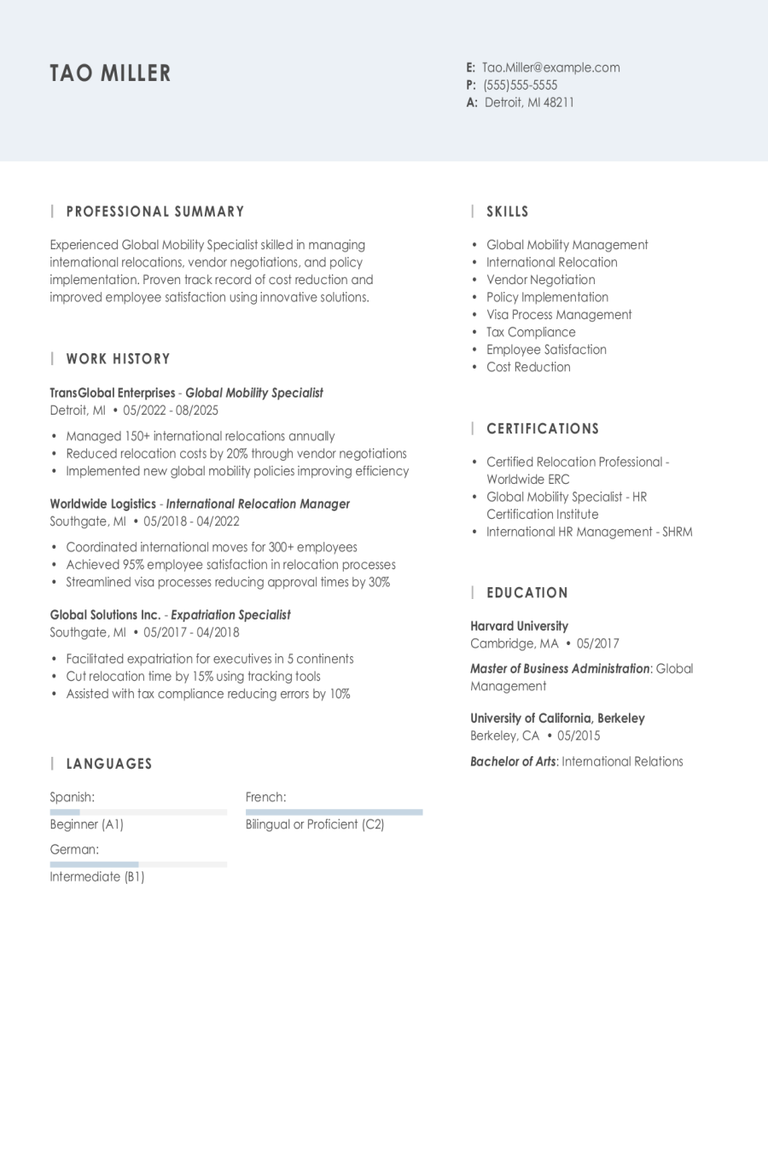
Global Mobility Specialist Resume Examples & Templates
Explore global mobility specialist resume examples to see how to showcase your skills in coordinating international assignments and managing employee relocations. Browse tips to help you highlight your expertise in
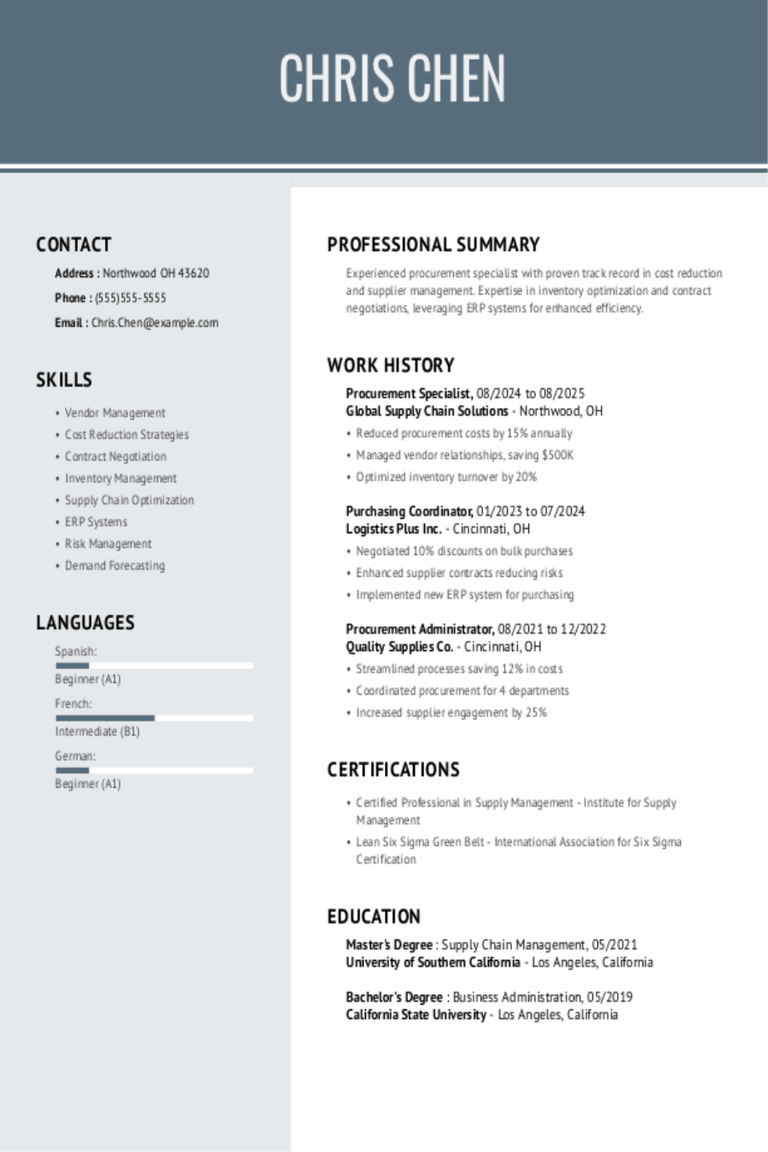
Procurement Specialist Resume Examples & Templates
Browse procurement specialist resume examples that showcase experience handling purchasing, managing vendor relationships, and negotiating contracts. These examples and tips will help you highlight your ability to secure the best
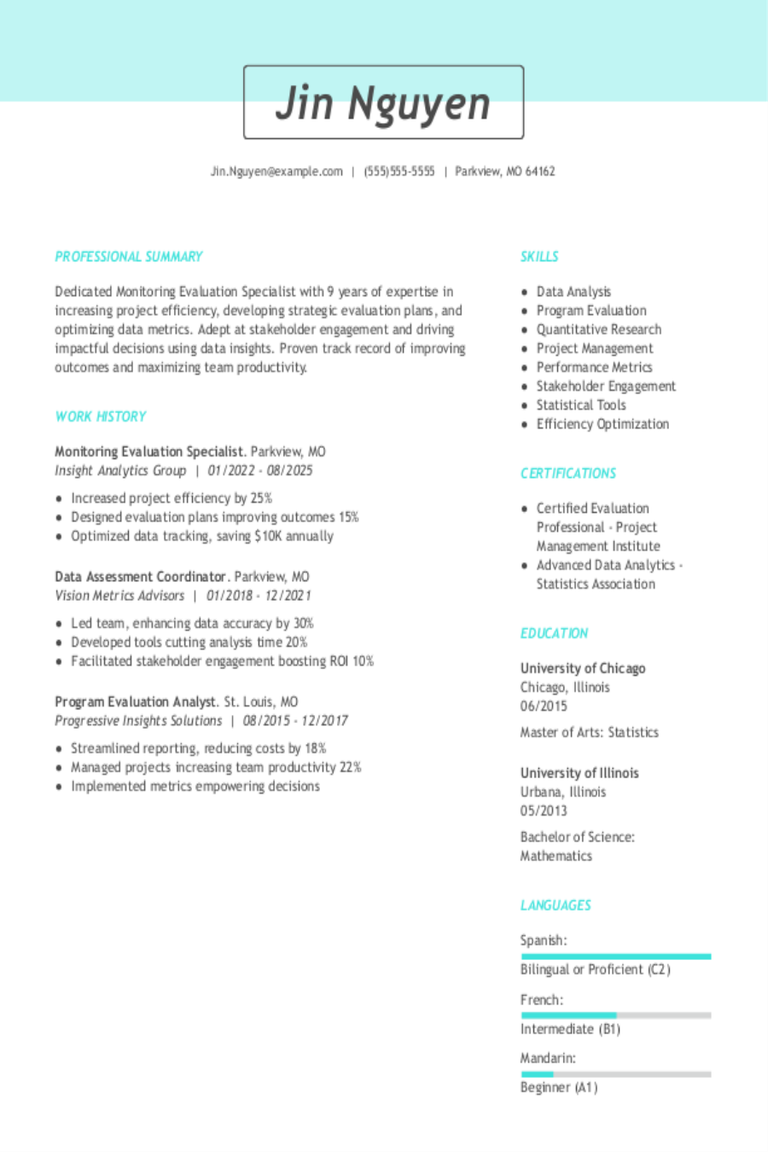
Monitoring Evaluation Specialist Resume Examples & Templates
Explore monitoring evaluation specialist resume examples and tips to help you spotlight your analytical skills and experience in tracking project success.Build my resumeImport existing resumeCustomize this templateWhy this resume worksQuantifies
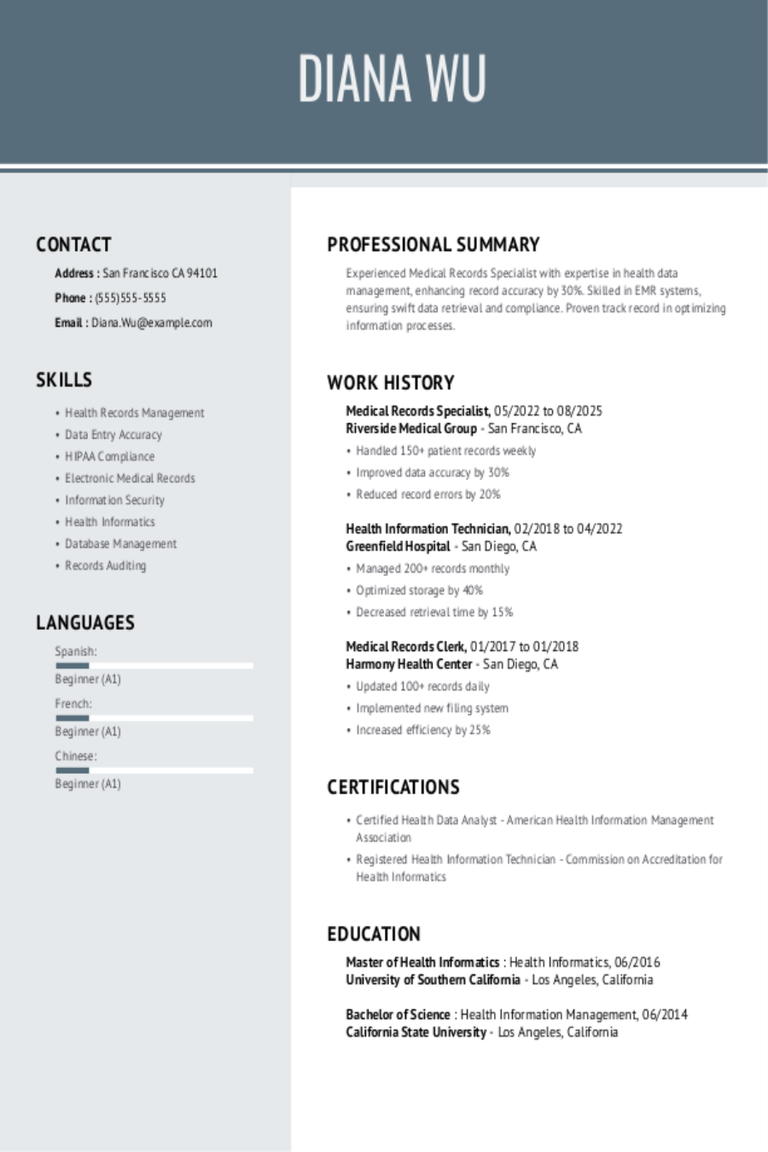
Medical Records Specialist Resume Examples & Templates
Explore medical records specialist resume examples to see how to showcase your experience organizing data, protecting patient privacy, and supporting healthcare teams. Discover tips to highlight your skills in managing
